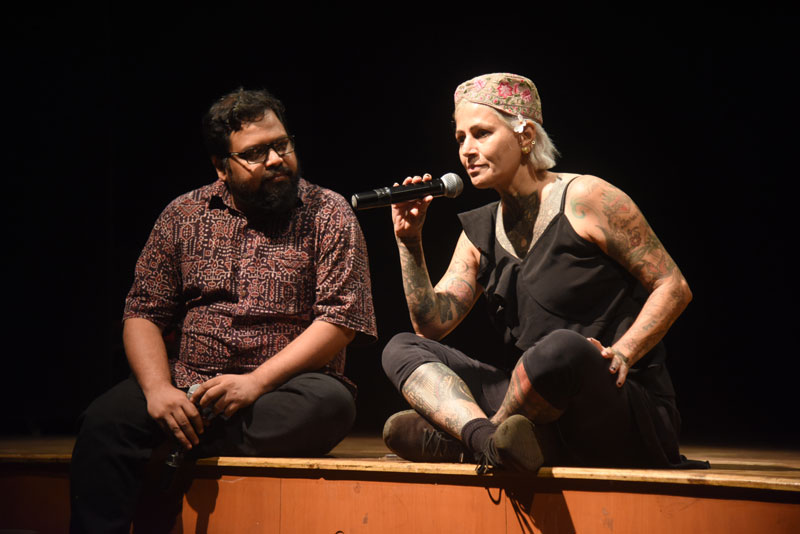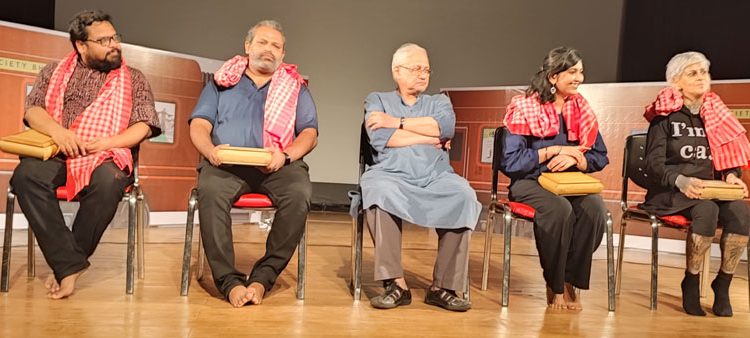- Total 34 films screened, 12 films made by women film makers
- Film maker Sapna Vavnani and Surbhi Dewan felicitated
Bubaneswar: Three day long third edition of Indian Documentary Film Festival Bhubaneswar organised by Film Society Bhubaneswar has concluded with much fan fare. Documentary lovers of the city feel lucky themselves to witness different aspects of life as films are based on subjects like homosexuality and transgender. These films are screened on different languages like Hindi, English, Bangla, Manipuri, etc.
Organised at Odissi Research Centre, total 34 films screened in this much talked about festival out of which 12 films prepared by women filmmakers. The venue had two zones for parallel screening. Third and concluding day highlight were two films; one is of Surbhi Dewan’s Trans Kasmir and Sapna Vavnani’s Sindhusthan. Both films based on Kasmir.
The last day of IDFFB began with the screening of Ghar Ka Pata by Madhulika Jalali followed by Trans Kashmir by Surbhi Dewan in Zone 1. While both are based in Kashmir, the former attempts to weave a narrative of the place and the time gone by, with a series of anecdotal experiences with Jalali’s family when the director’s father took them back to Kashmir 24 years after they had to leave the valley and the latter deals with the extreme hardships, resilience and beauty of Kashmir’s transgender community and their growing movement for basic human rights.
Sindhusthan by Sapna Bhavnani was next which narrates the stories of the largest migration of a culture in history – the Sindhi migration, along with the director’s, illustrating her journey on her skin.
This was followed by a film in special focus – Karbala Memoirs by Sourav Sarangi which looks at Hussain’s martyrdom from the perspective of an Indian who accidentally happens to be in the ancient land that has been ravaged by war, extremism and autocracy. Following that was Gosain by Bishal Swargiary which talks about the significance and traditions surrounding the Doul Purnima (Holi Festival), as well as the mythology of the discovery of Narasimha Gosain by the Banka Kachari while excavating a pond.

On this occasion, Filmmakers Sapna and Surbhi were felicitated by FSB Executive member Sankalp Mohanty. The volunteers and interns of the festival were felicitated by the filmmakers. The festival Vice President of FSB Ishwar Mohanty then delivered the vote of thanks and acknowledged the sponsors of the festival, Jindal Steel Power Plants and State Bank of India and appreciated the continuous presence of the audience.
After that, Siege in the Air by Muntaha Amin was screened which focused on the communication blockade of 2019 in Kashmir, post Article 370 abrogation and its impact on mental health, mobility, education and desires of the young women of the valley.
The closing film of IDFFB 2022 was All that Breathes by Shounak Sen. The film follows two brothers who run a bird hospital dedicated to rescuing injured black kites, a staple in the skies of New Delhi, India.
Next up was a film in special focus – Ek Tha Gaon by Shristi Lakhera based in the Himalayan foothills of Garhwal, following an 80 year old woman and a 19 year old girl, two of the seven remaining inhabitants of an abandoned village who struggle with the choice to leave for an alienating city life or to continue living in a lonely village.Buwati Nodir Dore by Neelansh Mittra was screened thereafter which showed the rapid cultural transformation in the Sonowal Kachari tribe after the recent exposure to the internet and how the traditional folk songs are being remixed in a modern way in the city leaving the members of the tribe in the village, worried about the future of their cultural identity.

The festival ended with Abhijit Das’s Cham (Meditation in Action). This film is a visual installation of images through which it tries to narrate the life, spiritual journey and understanding of life philosophy of the lives of Lamas (Monks) of the Tawang Monastery and of the villagers living in the Mon region.
The assemblage in Zone 2 witnessed a conversation with Sapna Bhavnani, the director of Sindhusthan, a session with Surbhi Dewan, the director of Trans Kashmir and a session with John Xaviers on the process of application writing for grants under IFA (Indian Foundation for the Arts) Arts Programs.

